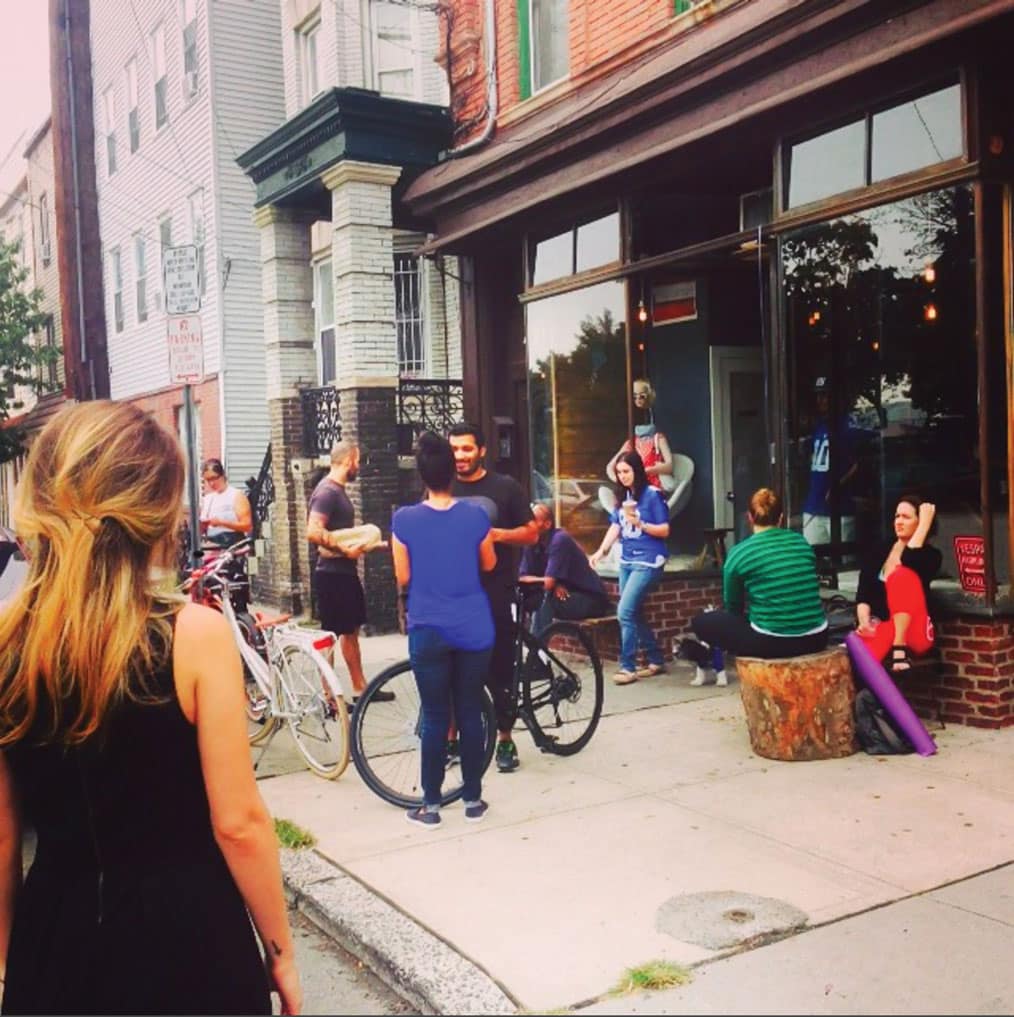[T]he mantra you always hear in real estate is “location, location, location.” In the coffee industry, finding the right location is a challenge, especially when you’re trying to grow your business in an area where property values are extremely high. Not only does the cost of building become a hurdle, but you’ll likely be competing with bigger, more familiar brands in the same area. The real question becomes: how do you find a way to break into the market and attract a loyal following?
Modcup founders Travas Clifton and Justin Hicks met at a Willem Boot coffee course in San Francisco and decided to start their business by waking up early and dragging their coffee cart to Hoboken, New Jersey, (right across from New York City) near a busy transit hub and office center.
Soon after, they attracted other coffee professionals like Ryan Foster to help them grow the business. Customers of Modcup Coffee Co.’s first mobile shop saw what looked like a converted hot dog cart equipped with an enigmatic lever-pull espresso machine, pour-over bar, and all the stylings of a unique coffee shop.
Over the last three-and-a-half years, Modcup has stayed on the road with a 1969 Citroën H Van and a variety of mobile setups, including a modified version of the original mobile café. The company also opened a café in the burgeoning neighborhood of Jersey City Heights, and a roastery-café combination to supply the growth of its cafés and wholesale partnerships.
Even as old projects develop and new ones take shape, everything is built from what Clifton and Hicks learned starting on the streets: adaptability, frugality, and personality.
When temperatures outside start dipping below forty degrees, your fingers go numb, and the electric kettles are barely reaching temperatures hot enough for pour-overs, all the romanticism of being “out there” with a business gives way to the reality of hard work (along with plenty of frustration and expletives).
In mobile operations, issues seemingly pop out of nowhere, leaving no choice but to solve the problem in the moment and keep things running. The mandate to persist comes not only from the mobile operation supporting your livelihood, but because there’s likely a line of ten severely under-caffeinated people waiting to get their fix. There’s no time to call a technician— you are the technician, jerry-rigging stubborn equipment to keep customers happy and your books balanced.
Whatever the Modcup team did in those hectic moments usually resulted in a permanent fix, but the challenges taught them important lessons about each cog of the wheel that keeps their operation moving. They learned how to adapt their designs and models to the surrounding conditions, a lesson that continues to drive every aspect of the company.
Beyond adapting to physical demands, mobile operations taught the Modcup team a way to responsibly figure out how to meet the demands of the markets they were most attracted to. The struggle for many businesses in the food and beverage industry is the risk involved in taking on a new location. When you factor in rent, build-out cost, and any number of other expenses, you can’t ensure success, even when you have an outstanding product.

What gave Modcup the confidence to open their first brick-and-mortar café wasn’t just the ability of a space with an amazing view of New York City, but the knowledge they were about to open across the street from where their mobile operation launched in the neighborhood farmer’s market.
Before signing a lease or starting payments on a build-out, the team had already built a local client base, discerned the character of the neighborhood, and determined the direction the café needed to take for success.
While they took notice of the way many cafés in and around NYC tried to attract customers by boasting state-of-the-art equipment, familiar third-wave roasting companies with good reputations for quality, and the ubiquitous fedora, Modcup set out to create a unique identity for their brand. They adapted the café to welcome customers and invite them on the company’s growth journey.

Clifton, Hicks, and Foster encouraged engagement with the Modcup brand through a slogan that said “unplug and connect,” alluding to their decision not to provide Wi-Fi. Not only was this a request from many local patrons, but it changed the way people regarded the café as part of the specialty coffee movement. Spunky record player tunes replaced the muted world of hipsters with earbuds and iPhones, warm conversation cast out any air of a co-working space, and people excitedly discussed coffee, the neighborhood, and everything else that brought them together in the small space with a great view.
Even as the Jersey City Heights neighborhood changes, as many neighborhoods on the cusp of large metropolitan areas tend to do, the Modcup team is open and ready for those changes—including competing with several coffee purveyors in the area. While the café started as a combination of a local coffee shop and a well-sought destination for coffee geeks in the region, it’s a great testament to the lessons learned by starting on the streets.
—Travas Clifton, Justin Hicks, and Ryan Foster are the brains and leadership behind Modcup.








